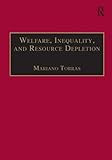Welfare inequality and resource depletion: a reassessment of Brazilian economic growth Torras, Mariano
Publication details: Aldershot Ashgate Publishing Ltd. 2003Description: xii, 191 pISBN:- 9780754631538
- 338.98107
| Item type | Current library | Call number | Status | Date due | Barcode | Item holds | |
|---|---|---|---|---|---|---|---|
 Book
Book
|
Ahmedabad | 338.98107 T6W3 (Browse shelf(Opens below)) | Available | 167717 |
Browsing Ahmedabad shelves Close shelf browser (Hides shelf browser)
Includes bibliographical references (p. [171]-184) and index
This book breaks new ground by accounting for the welfare implications of both severe inequality and environmental degradation and developing a sustainable development indicator that incorporates changes over time in each of these dimensions. The model is applied to data from Brazil spanning the 1965 -1998 period. The book's findings cast significant doubt on the proposition that rapid economic growth in Brazil has resulted in comparable welfare gains. The evidence presented more generally illustrates the often unsustainable nature of rapid GDP growth phases, as well as the general unreliability of GDP growth as an indicator of well-being improvement. The specific policy implication is that Brazil should discontinue - or at least severely curtail - the regressive and resource intensive economic policies it has followed in recent decades in the interest of welfare improvement not only for the poorer groups in society, but for future generations of Brazilians as well. Source: http://search.barnesandnoble.com/
There are no comments on this title.




